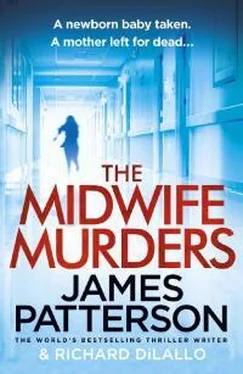Then Devan speaks: “How long will this baby be living here?”
I don’t like the tone of “this baby.”
So I field the question: “A few weeks, a few months, maybe even longer.” No reaction.
Willie asks, “What’s the baby’s name?”
“I don’t think she’s absolutely fixed on a name. She’s thinking she may name the baby for a relative, like an aunt or a grandma.”
“So this baby is a girl?” asks Devan. His reaction sounds neither positive nor negative at the gender news.
“Can we give her a name?” Willie asks.
I’m thinking, and I’m sure Sabryna is thinking also, about the list of names we went through—Stupid-head, Antonio Brown, Dirtball, Lucy the Second, Killer Kahn, Spaz—before we settled on The Duke for our dog.
Sabryna has the correct, all-purpose, never-fail parental answer: “We’ll see. We’ll see.” For this magical phrase to work, it must be said four times. So Sabryna adds another round. “We’ll see. We’ll see.”
Willie yells, “Good deal.” And this apparently requires a high five between him and Devan.
There are, of course, follow-up questions. But the questions are practical ones: “Where will the baby sleep?” “Does the baby cry?” They ask nothing exceptionally serious, like, “Whose baby is this?” “Where did she come from?” Apparently in their world of Guardians of the Galaxy babies can just, well, magically show up, like the baby who’s showing up tomorrow.
We clear the table. The baby news has made the boys particularly helpful with the cleanup. What in the world are they thinking?
Sabryna begins scooping out sensible small portions of chocolate ice cream. Then quite suddenly the downstairs buzzer rings. We’ve heard it a thousand times before, but just in case we’d forgotten, Devan says, “It’s only the night buzzer for the store.”
Sabryna sighs. Then she says, “Probably some foolish neighborhood guy needing to pick up a six-pack of Red Stripe.”
“Maybe it’s the people with the baby,” Willie says.
Sabryna goes to the very unreliable intercom and presses a button. “We’re closed,” she says firmly.
“No. I look for Mrs. Lucy’s house,” comes a foreign-accented male voice.
“Who do you want?” Sabryna asks.
“The midwife,” the man says. “Is this her house?”
I’m instinctively worried that there’s an emergency somewhere. I hurry to the intercom. I sure hope I won’t be hurrying back to Gramatan University Hospital or making some unscheduled, unplanned neighborhood visit. I take the phone. “This is Lucy Ryuan. How can I help?”
The vaguely familiar voice comes back at me.
“I am Patrik Kovac. I am the father of Katra.”
CHAPTER 31
I LEAVE WILLIE DOWNSTAIRS with Sabryna and Devan. A few minutes later Katra’s father and I settle into my tiny and very untidy apartment.
Patrik Kovac sits on the one cleared chair in my living room. I sit on the edge of my foldout sofa. The foldout is, as always, open, messy, and covered with papers and books and clothing.
“There is a problem that I cannot keep inside me,” Patrik says as I pour him a cup of reheated morning coffee, coffee that wasn’t too great tasting when it was fresh.
“I cannot tell police. I cannot tell the neighbors. So I must tell you,” he says.
Of course I am both extremely curious and extremely nervous as to what he’s about to tell me. I am so accustomed to tales of abuse and poverty and immigration problems that I pretty much assume his story will fall into one of those categories.
“First I will ask, the people who hurt Katra, the people who stole my grandchild, do you catch them yet?” he asks. “Are they in the jail cell?”
“No, not yet.” I do not share with him my belief that Blumenthal’s investigation team is dragging its ass on the matter.
Then he leans forward in his chair. “Here is what I can tell you. The thief will be Russian, a man, maybe a woman, maybe both, maybe many people,” he says. And his hands are shaking so much that he must rest his mug of bad coffee on the pile of magazines near his chair.
“And how do you know that?” I ask.
“Because I know, because I know you will know when I tell you my story.”
Inside me is the urge to scream, For Chrissake, get on with it, buddy. Just tell me the story . But I don’t have to scream. Patrik Kovac begins to explain.
Three years ago, he and his wife and his fourteen-year-old daughter, Katra, entered the United States. Back in Croatia they had bought forged immigration-visitor papers that showed proof of relatives living in Sunnyside, Queens. Of course they actually had no relatives living in Queens or anywhere else in the United States. Their visitor permits were good for only three months. Patrik and his wife, Mariska, lived in fear every day. He tells me that a person “never becomes accustomed to fear. But we move on. Things will work out.”
I still am amazed by Patrik’s youthful presence. He looks like a Brooklyn hipster.
“Katra works as nanny for a mother in Flushing. Mariska works to clean office building at 34th Street. Me? I try. But no job. Sometimes I sweep barbershop and beauty parlor. But no job. Little money. But we will move on.”
I think Patrik may be planting the seeds of a sweet American immigrant success story. But I turn out to be really wrong with that prediction.
“Then last year Katra becomes pregnant.” He looks to the ground as if he’s just spilled the saddest story of his life. And it very well may be that among his many problems this one is indeed the saddest.
In my world, pregnancy is not an unusual condition. It’s my life’s work.
“Katra, she say the father of children she cares for makes her pregnant. Then she says she is fired. And the wife says she will have her thrown out of country. And then …”
A long pause.
“And then?” I ask. I’m bracing for bad stuff. I’m guessing that perhaps Patrik went after the baby’s father with a knife. I’m thinking that maybe they planned an abortion and then changed their minds. Turns out what I’m thinking isn’t nearly as frightening as what he tells me.
“One morning, early, five o’clock, two visitors, a man and a woman, knock on the door. I think they are Russian. I think they look like Russians, the accents are like the sound of Russian.”
Now the story really begins. The two “Russian” visitors have heard from one of the Kovacs’ neighbors—they do not tell Patrik who has informed them—that Katra is going to have a baby.
“They say they can give us money for Katra’s baby. They will buy the baby. They will give us one thousand dollars now and then they will give us nine thousand dollars more when they take the baby.”
I just nod. I’ve heard of these deals before. Not often. Not many. But I have heard of them. When you’re a New York midwife, you hear lots of scary stories.
“So we cry. And we cry. And we cannot stop crying. Mariska and Katra and I stand and cry in front of strangers who want to buy baby. The woman, she is nice. She comforts Katra. ‘Oh, the baby will be loved,’ the woman says. ‘She will be kept warm and in good schools always.’ The woman knows the people who want the baby.”
Another pause. I say absolutely nothing.
Then, “Katra says okay. ‘Ten thousand dollars!’ she says. ‘So much money.’”
“And you and your wife agree?” I ask.
“No. No, we do not agree. We scream that this cannot happen. We cry more and more. Finally, Mariska say maybe it’s for best.”
“So then you agreed?” I say.
“Yes. It is bad, but we say okay. Then we cry more and more.”
I’m no genius. I’m no psychologist. But I’m smart enough to know that a story that ultimately ends in a brutal forced C-section and the kidnapping of a newborn is not over yet. I want to reach for my iPad and look up my GUH chart on Katra. I have a vague recollection that her arrangements with my midwife group were legit. But there’s sometimes chaos and many screwups at a huge hospital, and … and Mr. Kovac has more to tell.
Читать дальше












